- Home
- Frank V. Webster
Boy Pilot of the Lakes; Or, Nat Morton's Perils Page 18
Boy Pilot of the Lakes; Or, Nat Morton's Perils Read online
Page 18
CHAPTER XVIII
NAT'S PLUCKY PILOTING
"Well, if that isn't tough luck!" exclaimed Nat.
"I suppose Bumstead thinks just the opposite," remarked the pilot.
"I wonder if he heard of our plan, and made the change of boats toescape us?"
"I think not. He could not know that we were after him. I fancy themate and Captain Marshall had some disagreement. I know the mate didnot like Mr. Marshall, who, in fact, was rather afraid of Bumstead.Very likely they had a quarrel, and the mate got aboard the firstvessel he met."
"Then we can't have him arrested."
"Oh, I guess we can. It will take a little longer, that's all. He'ssure to stick around the lakes, as he doesn't know enough ofnavigation to get a job anywhere else. News travels pretty well amongthose engaged in business up here, and we'll get on his track sooneror later."
"I hope so, for I want that money. When I didn't know I was to get anyI was pretty well satisfied, but now that I have heard of this legacy,it seems as though I ought to get it."
"And so you shall. But I must telegraph to Mr. Scanlon. I don'tbelieve we can ask him to do any more for us. He probably wants tocontinue on to New York. Besides, we can't inform him where to lookfor Bumstead. I'll just wire, thanking him, and tell him we'll lookafter the rascal now."
"I guess that's the only plan."
A message was sent to Mr. Scanlon, and by that time the _Mermaid_ wasready to proceed. The indications of the storm became more pronounced,but it did not break that night.
Day after day slipped by and Nat kept steadily at work, learning allabout piloting that was possible. It was wonderful how quickly heacquired the art of navigation.
"The boy was born to it," declared the old pilot to the captain. "Heknows as much about it already as many assistants who have been at thewheel for ten times as long."
Mr. Weatherby was far from well, and Nat noticed that he could notkeep at the wheel as steadily as before. One evening when a heavystorm was brewing the old pilot said every bone in his body ached.
"Guess I'm in for a spell of sickness, sure," he remarked.
"Can't you take some medicine?" asked Nat, sympathetically.
"Yes."
Mr. Weatherby took a large dose of quinine, so large that he wasunable to remain in the pilot-house after midnight, but as the routewas over a course he had previously traveled, Nat had no difficulty insteering the big vessel, with occasional help from Captain Turton.
"Well, Nat, how did you make out?" Mr. Weatherby asked him the nextmorning.
"Pretty well. I was a bit frightened at first, and I was afraid Iwould forget some of the signals, or read the lights wrong, and pilethe boat up on an island or a bar, but I didn't."
"Glad to hear it. I was a little anxious about you. Now whatever youdo, when you're in the pilot-house, don't lose your nerve. Just say toyourself that you're going to succeed, and bring the ship through, andyou'll do it."
"There's more responsibility here than on a freighter."
"Indeed, there is! Think of all the human lives entrusted to yourcare. That will make you keep your nerve in case you get in a criticalplace. But you did very well, and I'm proud of you."
"How are you feeling this morning?"
"Pretty well. I can take my trick now. You'd better turn in and getsome sleep. You may have to take part of the watch again to-night."
Nat did go to his bunk, after breakfast, but he did not stay therelong. One of the cabin stewards was injured by a fall down acompanionway, and Nat had to turn in and do this man's work. Theresult was the boy was kept busy nearly all day, occasionally taking aturn at the wheel.
Once, when he relieved Mr. Weatherby for a few minutes, while thepilot went below to take some medicine, he remarked to his benefactor:
"You don't look very well."
"And I don't feel very well, Nat. But I'm trying to stick it out.We've got a hard part of the lake ahead of us, a part where there aremore islands than you can shake a stick at, and I don't like to gothrough there. But we've got to do it."
"But how can you, if you're sick?"
"Pilots, as well as other persons, can't always do as they would liketo. I guess I'll be all right. But I don't like the weather. Thelonger this storm holds off, the worse it's likely to be. However,there's no use worrying. I'll be back in a few minutes. Keep her aboutas she is."
Left alone in the pilot-house Nat glanced at the compass, noted thecourse marked on the charts, and by moving the small steamsteering-wheel slightly, found that the ship answered readily to thehelm.
Off to the west there was a big bank of slate-colored clouds, fromwhich, now and then, came low rumblings of thunder.
"I guess it won't be long before the storm reaches here," thought theyoung pilot.
Almost before the boy realized it, an hour had passed. He was sointerested in steering the boat, and recalling the different pointsthat had been impressed on him by the pilot, that he did not noticethat Mr. Weatherby was gone much longer than he had said he would beaway.
"It's taking him a good while to get his medicine," murmured Nat. "Ihope he isn't going to be sick again to-night. I don't want to have tosteer the vessel among a lot of islands."
He was now anxiously awaiting the return of Mr. Weatherby, for thestorm seemed to be approaching more rapidly, and the darkness of thecoming night was added to by the black clouds, that now covered theentire sky.
Nat shifted the wheel, to keep the vessel on the prescribed course,and was looking ahead through the fast-gathering gloom, when some onecame into the pilot-house. He looked up to see Captain Turton, whoseface wore a worried look.
"I'm afraid we're going to have trouble," he said.
"How so, captain?"
"Mr. Weatherby is very sick. I was just in his cabin, and I found himin a semi-conscious state. He had tried to take some medicine, butbefore he could get it he was seized with a sudden fit of sickness. Icalled in the doctor, and he said the pilot would not be able to takecharge of the vessel to-night. I don't know what we're going to do,unless you can steer. Do you think you can?"
Nat hesitated. He had taken the freighter over this same course, whenMr. Weatherby was in the pilot-house with him, but that was in calmweather and daylight.
Could he steer the big passenger steamer over the same course afterdark, and with a storm coming up? It was a question grave enough tomake even an older person than Nat hesitate.
"It's a pretty big contract for a lad," said the captain. "I'll helpyou all I can, but the rules require me to have a pilot in charge. Ican't do it, unless you feel that you can steer the ship, with suchhelp as I can give you. Otherwise, I shall have to put into thenearest port, and I dislike to do that, as it will disarrange thepassenger schedule, and the owners object to that."
"I--I think I can do it--at least I'll try," said Nat, determined to"keep his nerve" as the pilot had advised him. "I'll do my best."
"That's the way to talk, Nat! I guess you'll make out all right. NowI'll have to go to help look after Mr. Weatherby. He is in a bad way."
"Do you think he will--die?"
"Oh, no, it's not as serious as that, but he's quite sick."
As the captain turned away the rumbling of thunder grew louder, andthere came fitful gleams of lightning from the black clouds.
Nat drew a long breath, and prepared himself for what he felt sure wascoming. Then, almost as calmly as if it had been Mr. Weatherbyhimself, he gave his orders. The lookout was stationed in the bow, andthe great searchlight, on a mast back of the pilot-house, and somedistance above it, was set aglow. This was to disclose, during thestorm, any vessels or other obstructions in the path of the _Mermaid_.This done, Nat prepared for his difficult task.
It grew darker, but with the blackness came the flashing of the beaconlights on dangerous reefs and islands. Nat was able to pick out hisposition fairly well, and he began to feel less nervous.
Suddenly, with a furious burst of wind, and a dash of rain, the stormenve
loped the vessel. Great waves arose on the lake, and the shipbegan to pitch and toss. In fact, a storm on one of the great lakes isalmost as bad as one at sea, if not worse, for it does not take longfor the comparatively shallow water to become very much agitated.
"The storm enveloped the vessel"]
Nat signaled for full speed ahead, as he knew he would need all thesteerageway possible to take the vessel through the waves that, everymoment, were becoming larger.
He had his supper in the pilot-house, for he would not leave to go tothe cabin for it. Captain Turton came in during the evening to reportthat while Mr. Weatherby was resting easily, he was still quite ill.
"Do you think you can stick out through the night?" the commanderasked.
"I'm going to," was Nat's plucky answer, though the boy was very tiredfrom his long vigil the night previous, and his lack of sleep duringthe day. But Nat was not going to give in.
After the first outburst the storm settled into a steady blow, withtorrents of rain, and an occasional brilliant flash of lightning, andloud peals of thunder. Through it rode the ship, urged on by herpowerful engines.
The night wore on. Wearily, Nat clung to the small wheel in front ofhim, shifting the course of the vessel now and then, as he picked outthe route on the chart, or made a quick shift to avoid some bar orisland. His arms and legs were weary. His eyes were hot and smartingfrom lack of slumber and rest. But he stuck it out. Captain Turtonoffered to relieve him, but the boy did not want to give up. Even hadhe done so, the relief would have been short, as, while the commanderwas proposing it, word came that the ship had sprung a small leak, andthe captain's presence was needed to see that the pumps were setgoing.
"We're depending on you, Nat," he said as he left the pilot-house.
"I'll stick it out," again came the plucky reply.
About three o'clock in the morning the wind shifted. The lake becamechoppy, from the cross seas, and a second section of the storm seemedto make its appearance. Nat, who in spite of his efforts to stay awakehad caught himself nodding--in fact almost asleep once--started upsuddenly. He peered out of the windows.
There, right in the path of the vessel, illuminated by the powerfulsearchlight, was a mass of foam. At the same moment the lookoutyelled:
"Breakers ahead! We're headed for a reef!"
With a quick motion, while his heart almost stopped beating, Nat spunthe little wheel around. The ship quivered. It seemed to hesitate, asif debating whether or not to rush to destruction on the sharp rocks,just hidden under the treacherous water, or to glide to one side.
Then, slowly, so slowly that Nat's heart almost ceased beating lestshe should not change her course quickly enough, the _Mermaid_ swungaround, and her prow was pointed away from the dangerous reef.
Nat's plucky piloting had saved the vessel!
Into the little pilot-house rushed the captain. He had heard thelookout's cry, and had guessed what had happened.
"We were almost on Dagget's Point reef!" he exclaimed. "How did weescape it?"
"I saw it in time," answered Nat modestly.
"Thank God!" cried the captain, as he grasped the young pilot by thehand. "There's deep water all around us, and if we'd struck it wouldhave meant a terrible loss of life."
At that instant there was a hoarse scream from a siren whistle, and,peering out of the windows of the pilot-house, Nat and the captainsaw, looming up in front of them, but some distance away, anothersteamer. Nat blew a caution signal, and it was answered from the othervessel, which quickly turned aside, and then disappeared in the mistof rain.
"I believe they were headed right for the reef, too," said thecaptain. "You warned them in time. Well, we have a good course fromnow out. I'll take the wheel, and you go lie down."
But Nat would not. He insisted on remaining in the pilot-house untilmorning, and when daylight came, he saw that the other vessed was notfar from them, both ships being headed for the same harbor. The othership was the _Spray_, of much smaller tonnage than the _Mermaid_.
"She must have turned back after meeting us," thought Nat, "as she washeaded in the opposite direction when we met near the reef."

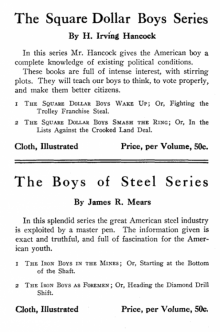 The Iron Boys in the Mines; or, Starting at the Bottom of the Shaft
The Iron Boys in the Mines; or, Starting at the Bottom of the Shaft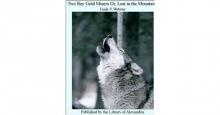 Two Boy Gold Miners; Or, Lost in the Mountains
Two Boy Gold Miners; Or, Lost in the Mountains The Boys of Bellwood School; Or, Frank Jordan's Triumph
The Boys of Bellwood School; Or, Frank Jordan's Triumph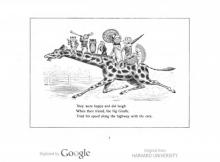 Book of Cheerful Cats and Other Animated Animals
Book of Cheerful Cats and Other Animated Animals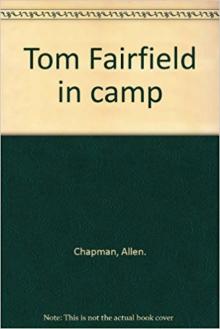 Ralph of the Roundhouse; Or, Bound to Become a Railroad Man
Ralph of the Roundhouse; Or, Bound to Become a Railroad Man Jack of the Pony Express; Or, The Young Rider of the Mountain Trails
Jack of the Pony Express; Or, The Young Rider of the Mountain Trails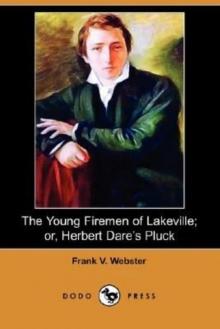 The Young Firemen of Lakeville; Or, Herbert Dare's Pluck
The Young Firemen of Lakeville; Or, Herbert Dare's Pluck Boy Scouts of Lenox; Or, The Hike Over Big Bear Mountain
Boy Scouts of Lenox; Or, The Hike Over Big Bear Mountain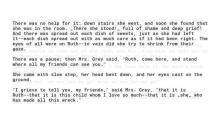 Book of One Syllable
Book of One Syllable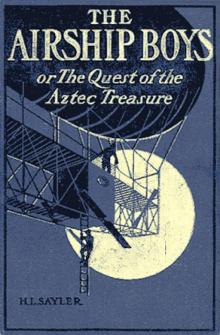 Air Ship Boys : Or, the Quest of the Aztec Treasure
Air Ship Boys : Or, the Quest of the Aztec Treasure Boy Pilot of the Lakes; Or, Nat Morton's Perils
Boy Pilot of the Lakes; Or, Nat Morton's Perils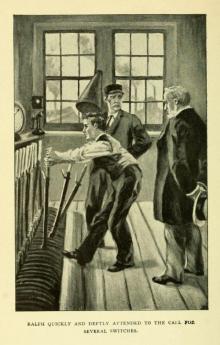 Ralph in the Switch Tower; Or, Clearing the Track
Ralph in the Switch Tower; Or, Clearing the Track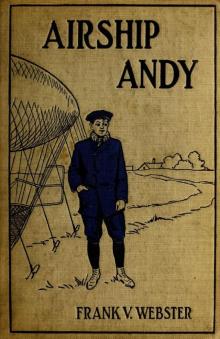 Airship Andy; Or, The Luck of a Brave Boy
Airship Andy; Or, The Luck of a Brave Boy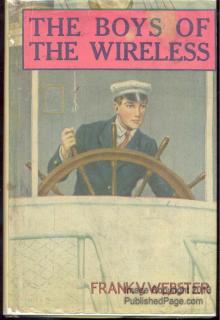 Boys of the Wireless; Or, A Stirring Rescue from the Deep
Boys of the Wireless; Or, A Stirring Rescue from the Deep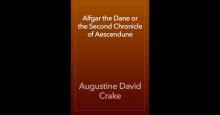 Alfgar the Dane or the Second Chronicle of Aescendune
Alfgar the Dane or the Second Chronicle of Aescendune Boy Knight
Boy Knight Boy Ranchers Among the Indians; Or, Trailing the Yaquis
Boy Ranchers Among the Indians; Or, Trailing the Yaquis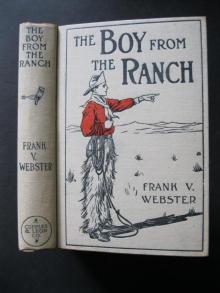 Boy from the Ranch; Or, Roy Bradner's City Experiences
Boy from the Ranch; Or, Roy Bradner's City Experiences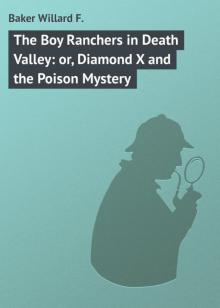 Boy Ranchers in Death Valley; Or, Diamond X and the Poison Mystery
Boy Ranchers in Death Valley; Or, Diamond X and the Poison Mystery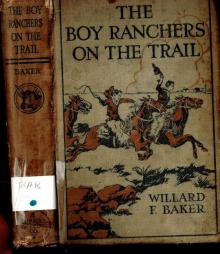 Boy Ranchers on the Trail; Or, The Diamond X After Cattle Rustlers
Boy Ranchers on the Trail; Or, The Diamond X After Cattle Rustlers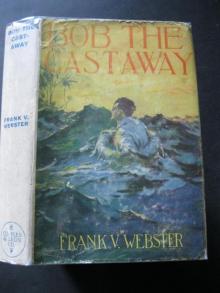 Bob the Castaway; Or, The Wreck of the Eagle
Bob the Castaway; Or, The Wreck of the Eagle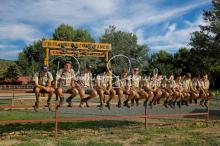 Boy Ranchers in Camp; Or, The Water Fight at Diamond X
Boy Ranchers in Camp; Or, The Water Fight at Diamond X Boy Ranchers; Or, Solving the Mystery at Diamond X
Boy Ranchers; Or, Solving the Mystery at Diamond X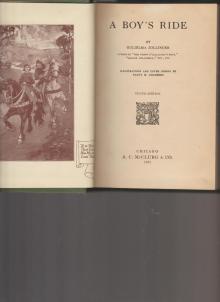 Boy's Ride
Boy's Ride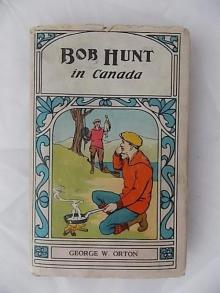 Bob Hunt in Canada
Bob Hunt in Canada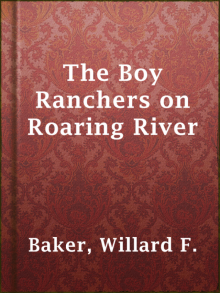 Boy Ranchers on Roaring River; Or, Diamond X and the Chinese Smugglers
Boy Ranchers on Roaring River; Or, Diamond X and the Chinese Smugglers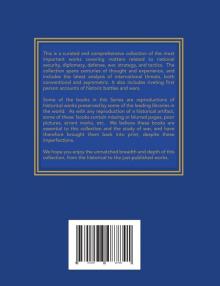 Alida; or, Miscellaneous Sketches of Incidents During the Late American War.
Alida; or, Miscellaneous Sketches of Incidents During the Late American War.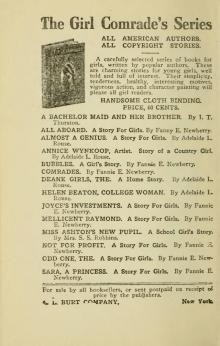 All Aboard: A Story for Girls
All Aboard: A Story for Girls Bob Chester's Grit; Or, From Ranch to Riches
Bob Chester's Grit; Or, From Ranch to Riches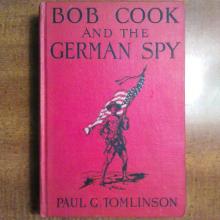 Bob Cook and the German Spy
Bob Cook and the German Spy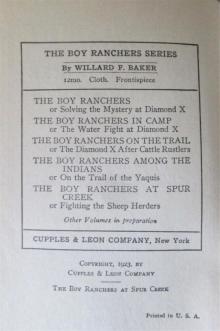 Boy Ranchers at Spur Creek; Or, Fighting the Sheep Herders
Boy Ranchers at Spur Creek; Or, Fighting the Sheep Herders